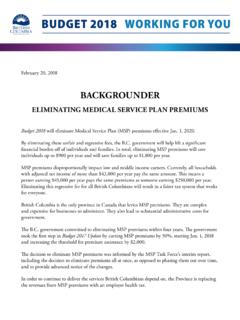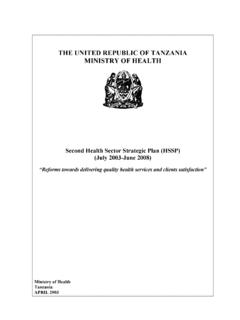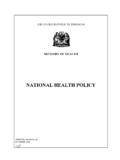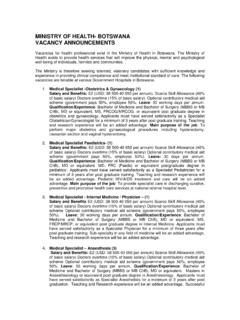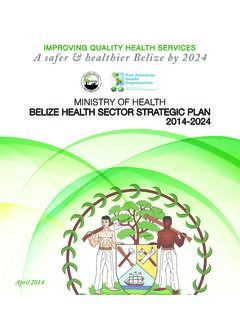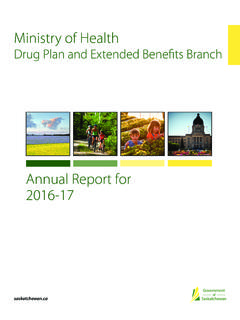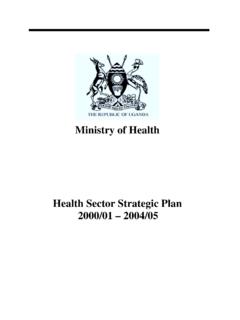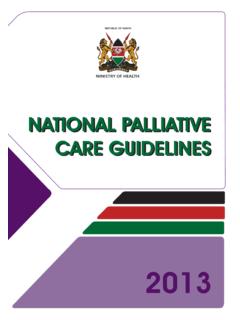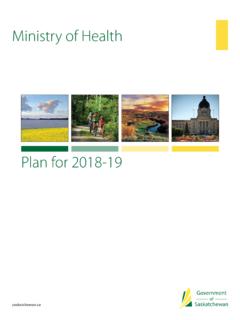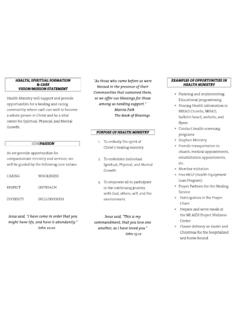Transcription of Ministry of Health 2018/19 - 2020/21 Service Plan
1 Ministry of Health 2018/19 2020/21 . Service PLAN. February 2018. For more information on the Ministry of Health contact: Ministry of Health PO BOX 9639. STN PROV GOVT. VICTORIA, BC. V8W 9P1. Toll free in : 1-800-663-7867. In Victoria: 250-387-6121. Or visit our website at Published by the Ministry of Health Ministry of Health Minister Accountability Statement The Ministry of Health 2018/19 - 2020/21 Service Plan was prepared under my direction in accordance with the Budget Transparency and Accountability Act. I am accountable for the basis on which the plan has been prepared. Honourable Adrian Dix Minister of Health February 6, 2018. 2018/19 2020/21 Service Plan 3.
2 Ministry of Health Table of Contents Minister Accountability Statement .. 3. Purpose of the Ministry .. 5. Strategic Direction and Alignment with Government 5. Strategic Context .. 6. Goals, Objectives, Strategies and Performance Measures .. 6. Resource Summary .. 14. Health Authorities Sector Resource Summary .. 15. Major Capital Projects .. 16. Significant IT Projects .. 20. Appendix A: Ministry Contact Information .. 21. 2018/19 2020/21 Service Plan 4. Ministry of Health Purpose of the Ministry The Ministry of Health (the Ministry ) has overall responsibility for ensuring that quality, appropriate, cost-effective and timely Health services are available for all British Columbians.
3 The province's Health authorities are the organizations primarily responsible for Health Service delivery. Five regional Health authorities deliver a full continuum of Health services to meet the needs of the population within their respective geographic regions. A sixth Health authority, the Provincial Health Services Authority, is responsible for managing the quality, coordination and accessibility of specialized services and province-wide Health programs. The Ministry also works in partnership with the First Nations Health Authority (FNHA) to improve the Health status of First Nations in The Ministry is also responsible for provincial legislation and regulations related to Health care, including the Medicare Protection Act and the Health Professions Act.
4 The Ministry 's public Health roles include regulating food safety in food establishments through the Public Health Act Food Premises Regulation, and regulating drinking water safety through the Drinking Water Protection Act. The Ministry also directly manages a number of provincial programs and services, including the Medical Services Plan, which covers most physician services;. PharmaCare, which provides prescription drug insurance; and the BC Vital Statistics Agency, which registers and reports on vital events such as a birth, death or marriage. Strategic Direction and Alignment with Government Priorities The Ministry 's strategic direction aligns with government priorities including those identified in the Minister's Mandate Letter.
5 The Ministry 's strategic direction reflects the Confidence and Supply Agreement priority emphasis on Service delivery improvements including investment in seniors' care, expansion of team-based care, and others. These priorities integrate with Government's commitment to true, lasting reconciliation with First Nations in by moving towards fully adopting and implementing the United Nations Declaration on the Rights of Indigenous Peoples, the Truth and Reconciliation Commission of Canada: Calls to Action, and the M tis Nation Relationship Accord II. Successfully achieving the strategic direction requires close collaboration with partners, including Health authorities, physicians and Health care providers, unions, patients, Indigenous peoples, government partners, including the Ministry for Mental Health and Addictions, and other stakeholders.
6 The Ministry is aligned with the Government's key priorities: Government Priorities The Ministry of Health Aligns with These Priorities By: Focusing on cross sector change initiatives requiring strategic repositioning Delivering the services people (Goal 1). count on Supporting the Health and well-being of British Columbians through the delivery of responsive and effective Health care services (Goal 2). A strong, sustainable economy Ensuring an innovative and sustainable public Health system (Goal 3). 2018/19 2020/21 Service Plan 5. Ministry of Health Strategic Context British Columbians enjoy excellent population Health status, in large part because of higher levels of physical activity, healthier eating habits, and lower smoking rates compared to many other jurisdictions.
7 In addition to encouraging healthy choices, access to Health care is also important and every day, thousands of successful Health system interactions take place that result in high-quality care in areas such as maternity, acute, cancer, critical and trauma care, elective surgeries and diagnostic services. However, challenges do persist. Changing demographics of an aging population are putting pressure on the system, and gaps exist in the continuum of Service for mental Health and addictions. A renewed emphasis on whole-system approaches to help address these and other challenges is underway to ensure improved access to coordinated, comprehensive and quality Health care services across the province.
8 Addressing Service areas that have remained problematic and resistant to resolution despite significant effort will be key areas of focus to ensure a system that meets the needs of British Columbians. Measuring the success of these efforts is essential to understanding our progress. The Ministry remains committed to ongoing assessment of effectiveness and appropriateness of the performance measures and targets in this plan, and will refine and improve the measures, targets and methodologies to ensure they provide the most accurate and relevant information possible. In July 2017, the Ministry of Mental Health and Addictions was created to guide the transformation of 's mental Health and addictions system by setting the strategic direction for the province through cross-sector planning and driving system-level improvement through research, policy development, and evaluation.
9 Working with the Health authorities, the Ministry of Health is responsible for implementing the strategic direction to ensure an accessible and effective system of mental Health services for individuals and families. Goals, Objectives, Strategies and Performance Measures Goal 1: Ensure a focus on cross sector change initiatives requiring strategic repositioning The 2018/19 2020/21 Service Plan has been reorganized to more closely align with direction set for Health authorities, and to reflect the priorities of the Minister's Mandate Letter. Goal 1 has been refocused to emphasize the importance of achieving transformational progress across the Health sector, from metro and urban settings to rural and remote communities.
10 Objective : A primary care model that provides comprehensive and coordinated team-based care linked to specialized services Health care providers, administrators, policy makers and other partners across 's Health system are collaborating to identify and implement improvements to primary and community care. Innovations designed to better meet demand for services in a changing population have been introduced at the practice, Health authority, and provincial levels. Family physicians, nurse practitioners, nurses and other primary and community care allied Health professionals and support staff are central to the effort of supporting all patients.
